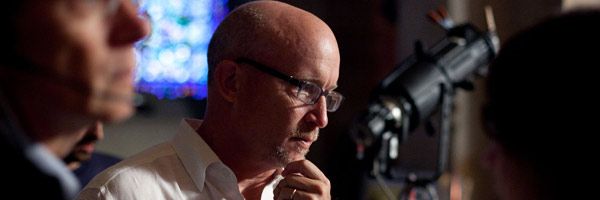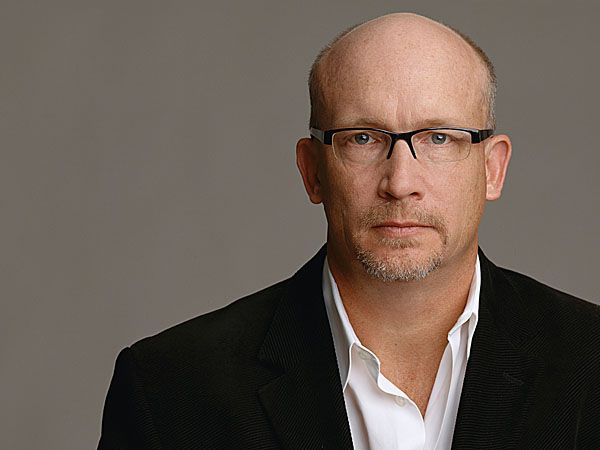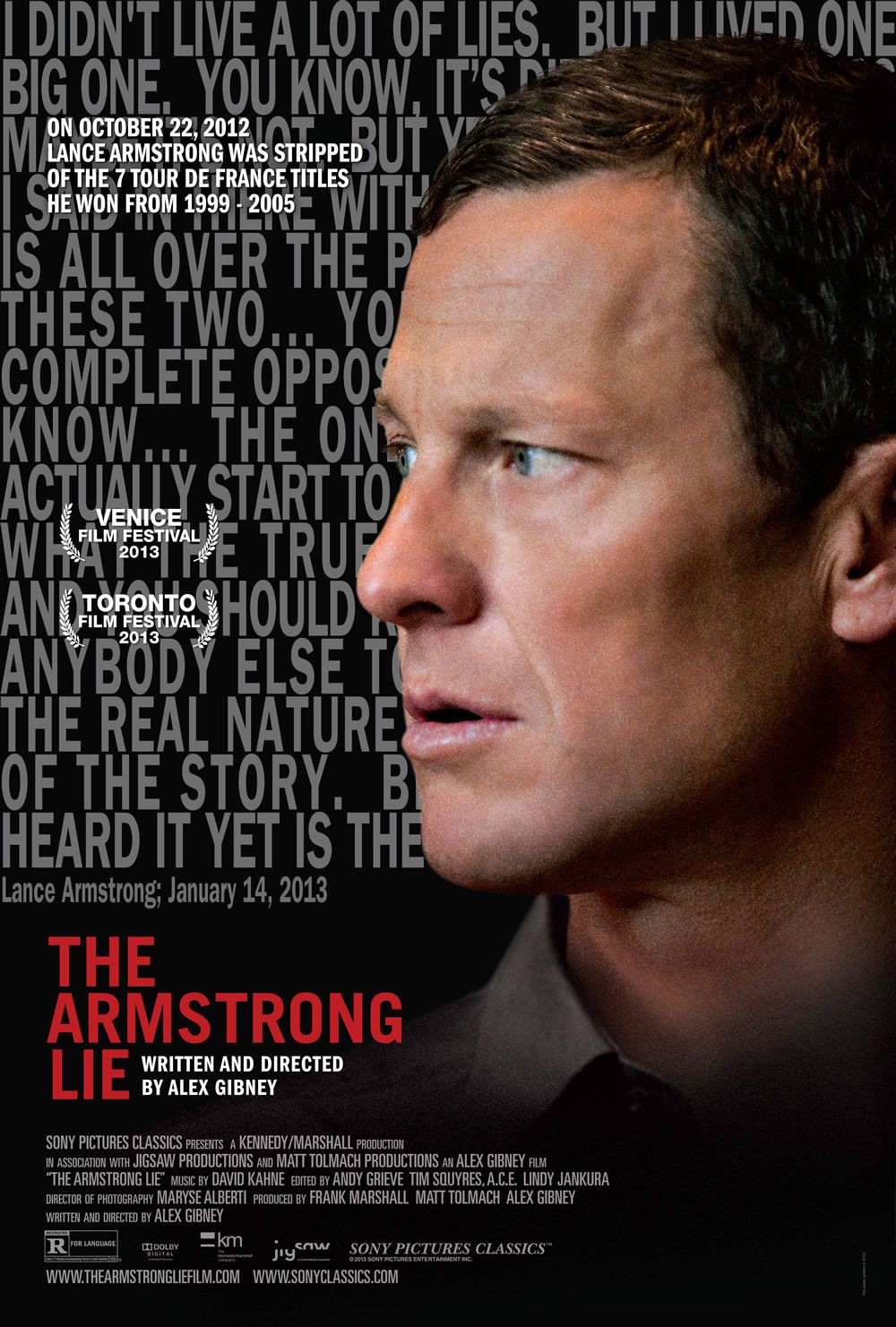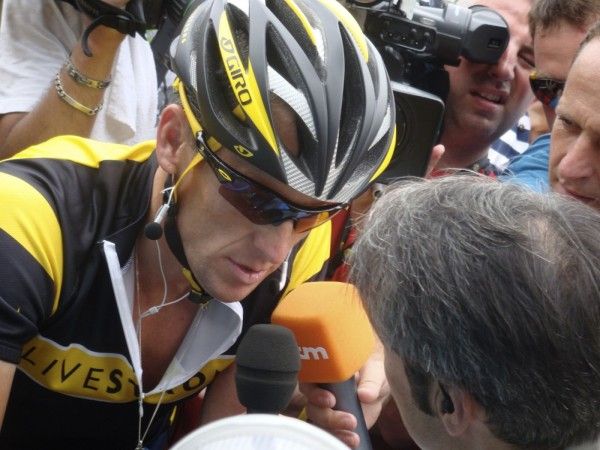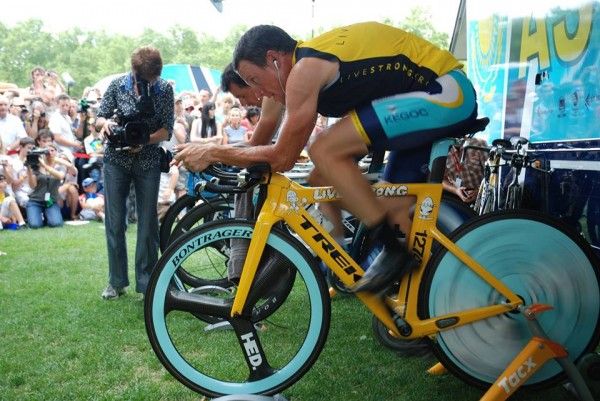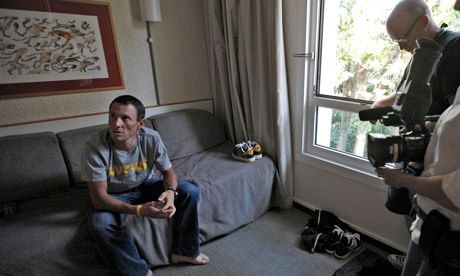Opening November 8th, The Armstrong Lie, directed by acclaimed documentary filmmaker Alex Gibney, follows one of the most fascinating stories in the history of sports, the impossible rise and spectacular fall of former cycling champion, Lance Armstrong. Given unprecedented access to Armstrong and the world of professional cycling, Gibney initially turned his cameras on the sports hero, his teammates and trainers in 2008-2009, embarking on what he believed would prove the ultimate comeback story. But by early 2013, once Armstrong admitted to using performance enhancing drugs, the film emerged as a riveting insider’s view chronicling the collapse of one of the greatest legends of our time.
In an exclusive interview, Gibney talked about first meeting Armstrong and his personal impressions of the man, how the project evolved into a story he’s more familiar with about corruption and the abuse of power and led to a more powerful film, his thoughts on the role the global media played in creating and destroying the Armstrong myth, how he found it intoxicating to have extraordinary access and difficult not to lose perspective, how he felt once he realized Armstrong had lied to him, and his upcoming fiction project, Private, that’s currently in development. Hit the jump to read the interview:
QUESTION: What appealed to you about this story and made you say this is a film I have to make?
ALEX GIBNEY: Well, at the beginning, I guess what appealed to me about it was I was interested in Armstrong’s will. I was interested in that for two reasons. One, for the more inspiring reason, he’s a guy who wills himself back to life from cancer and goes on to win the Tour. But also, I was aware of doping allegations, and I also saw him as a guy who was a kind of “win at all costs” character. And that aspect of his character interested me, too, not necessarily for inspirational reasons, but for other reasons. So, I was interested in his will. That’s what interested me first.
How did this project come about?
GIBNEY: I was approached originally by Sony, and they were the ones who approached me to do it. They had originally developed a feature film, a fiction narrative film based on his book, It’s Not About the Bike. They never found a script they liked. When he decided to come back, to do his comeback tour, then they asked him if they could do an interview. And then, they went looking for a director and they came to me.
How did you first meet Armstrong?
GIBNEY: I went down to Austin to discuss the idea and I met him at his house. He gave me a tour of his house, showed me a lot of his modern art collection, and we sat down and talked. I was quite candid with him. I said, “I know you ride a bike. I know you’re good at it. Beyond that, I don’t know that much. But I’ve been in this situation before and I’ll learn.” I think he appreciated that honesty.
You set out to make a comeback film about a sports legend and an inspiring athlete, but then his career suddenly started to unravel. How did your documentary evolve as a result, and do you think it led to a more powerful film?
GIBNEY: I think ultimately it did lead to a more powerful film, but it certainly wasn’t the film I set out to make. I’ve made a lot of films about abuses of power. I didn’t really think that that was what this film was going to be about. I thought it was going to be a much more straightforward sports film, even though, from the beginning, I knew I had to reckon with some of the allegations about doping. But I think over time, as the Armstrong story became more and more unbelievable, that is to say, the idea that he had never, ever used performance enhancing drugs, it started to become a story with which I was more familiar, a story about corruption, a story about abuse of power.
How did you gain access to some of the key people you interviewed and what was that experience like?
GIBNEY: It was hard for me at first, and I found it a little bit ironic and also deeply frustrating. Because I had such great access to Lance Armstrong, a lot of his critics refused to talk to me. They just assumed that I was in the bag, in the tank, and that was very frustrating. And then indeed, even as I got deeper into the story, one of the things that happened was that I’d begin to start to talk to people off the record, but still they wouldn’t speak to me on the record because they were afraid that the message wouldn’t get out because I was part of an insider project. It was very frustrating. So, the more I knew about the truth, the less I could express it because nobody would talk. When the floodgates opened in terms of allegations, then I was finally able to go out and get some of these people to talk to me on the record who had flatly refused before — people like Jonathan Vaughters. Also, I think Betsy (Andreu) always wanted to talk, but it just didn’t make sense to talk to her in the first incarnation of the film. So that’s kind of the way it went.
Was there anyone that you’d hoped to interview that you weren’t able to?
GIBNEY: In terms of a person I wish I could have spoken to, I suppose I wish I could have spoken to Floyd Landis. I did speak to him off the record, but I was never able to persuade him to go on camera probably because of legal issues. He’s the guy who launched the qui tam suit against Armstrong. This is a familiar problem with me. There’s always a tension between real courts, courts of law, and the court of public opinion. Lawyers in courts of law tend not to want their clients to tell the whole truth and nothing but the truth, despite the way that’s used as part of the oath. They want to tell a limited truth which has particular strategic objectives. And ironically, I think that’s where Lance Armstrong got caught, too. He got caught between those two courts. And there’s no real way to reconcile them.
What are your personal impressions of Armstrong based on what you discovered while making this film and the opportunities you had to sit down and interact with him on a personal level?
GIBNEY: On a personal level, I like him. I’ve enjoyed spending time with him. I find him to be a very smart guy, and he can be a terribly charming guy, but he can also be imperious. I never saw the darker side of him probably because it wasn’t in his interest to show me that side. But, on a personal level, I like him. But I’ve learned over a long period of time to separate my personal affect for somebody with their actions. You can like somebody and still not approve of what it is that they do. And so, I had to hold that in opposition, though part of what the film is about is losing that perspective and becoming a fan who is sort of baldly rooting for Lance. I thought it was appropriate to reflect on that because that’s very much how the lie worked. Everybody wanted so badly to believe in that beautiful lie that they really didn’t want to see the ugly truth.
What are your thoughts on the role the media played in promoting Armstrong’s rise and fall, turning him into a global star and then tearing him apart as he fell from grace?
GIBNEY: I think it’s an abject lesson in the carelessness and recklessness of the media at times. The media was interested in promoting his story as long as it lasted because it was good for copy. It was good for everybody to believe in that story. A lot of people wanted to believe in it. So the more you wrote it, the better it was. Yet it’s ironic because…well it’s not ironic. It’s fraud, because the media should have known better. This is a lie that was hiding in plain sight. There were a lot of allegations of doping along the way, rather credible ones. Even when you saw the report that finally came out, there was a lot of that. If you saw the report, it had been exposed a long, long time before. Most of the media was willfully blind to what was going on because the story was too good. And then, when Armstrong was exposed, suddenly all that was forgotten, and now Armstrong was a monster, and it’s horrible what he did. How could he have possibly fooled us all? Well, they were all willing to be fooled in the first instance. And I think that it’s more than a little bit problematic that they went from treating Armstrong as a god to treating him as the devil. In a way, you know what happens when that happens? Part of the problem with that is that you then miss the bigger story here. Part of the story is about a person, a human being. But the bigger story here is how this kind of thing happens in sports — how the organizers of the sport enabled Armstrong, how the sponsors enabled it, and how it was in some way all about the money. And then, there’s the larger pattern of abuse of power, which is played for keeps by people who are all cashing in on Armstrong’s myth. That story gets missed if you say, “Oh, it was all Lance.”
Who’s really at fault here, or was everyone complicit in this deceit, because as Armstrong says in the film, “Everyone was doing it”?
GIBNEY: That’s a tricky one because you don’t want to let Lance Armstrong off the hook. He had to take responsibility for what he did. But it’s also fair to say that there’s a larger context here. So it’s wrong to think of him as a victim. He’s not a victim. He’s made a fortune doing what he did, but he wasn’t alone in doing this. I don’t want this to come off wrong, but it’s a little bit like saying, “We got Al Capone. The Mafia’s gone.” Well, that’s not the way it works. There were a lot of people involved. And even when it comes to doping, it’s a fact that Lance Armstrong wasn’t the only one that was doping. There were a lot of people who were doping. So that context has to be observed, because otherwise you don’t get it right in the future. You think, “Well, we got rid of Lance Armstrong. Now the sport’s all good.”
You touched on this earlier. Was it hard to remain objective and not get caught up in the public relations machine as you were making the film?
GIBNEY: It was hard to be objective because you have extraordinary access, much like an embedded journalist has when he or she is out in the field with soldiers in a war. I was on the inside of that bubble and it was intoxicating. And I tried to maintain perspective, but it’s hard.
How did you feel when you discovered that he had lied to you?
GIBNEY: What ultimately happened was I realized that I was being played. That is to say, I was part of a promo operation and I was a kind of enabler, and that pissed me off. When he finally reached out to me and called me up to say he had been lying, it was a powerful moment because I felt that I had been played.
Can you talk about your upcoming project, Private, a drama about Bradley (Chelsea) Manning based on a book by Denver Nicks?
GIBNEY: It’s a fiction project, and we’re just in the process of developing it right now. I think it’s going to be really exciting.
What’s next for you in terms of documentaries? Are there any that you’re working on now?
GIBNEY: There are some, but none that I’m willing to talk about at the moment.

